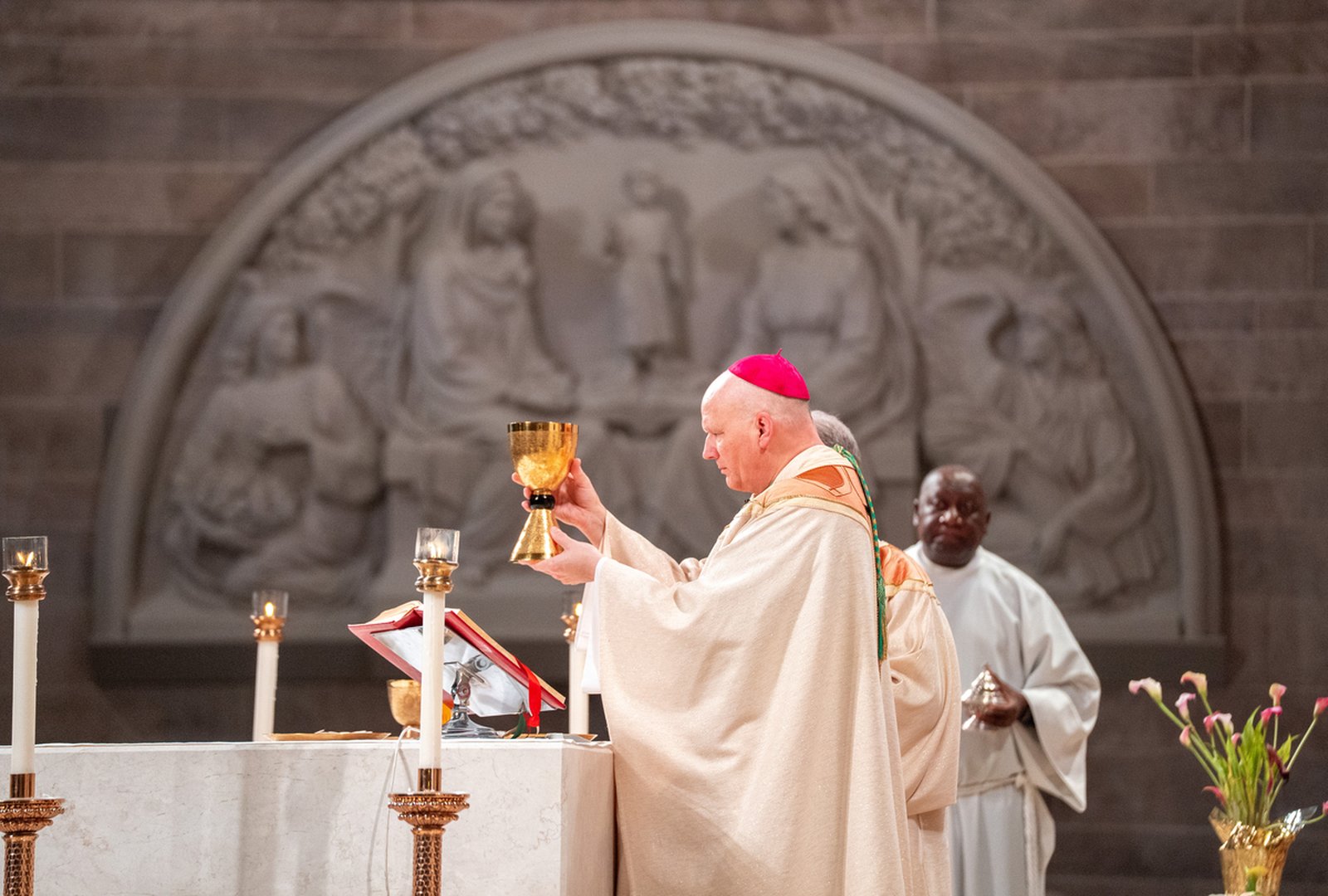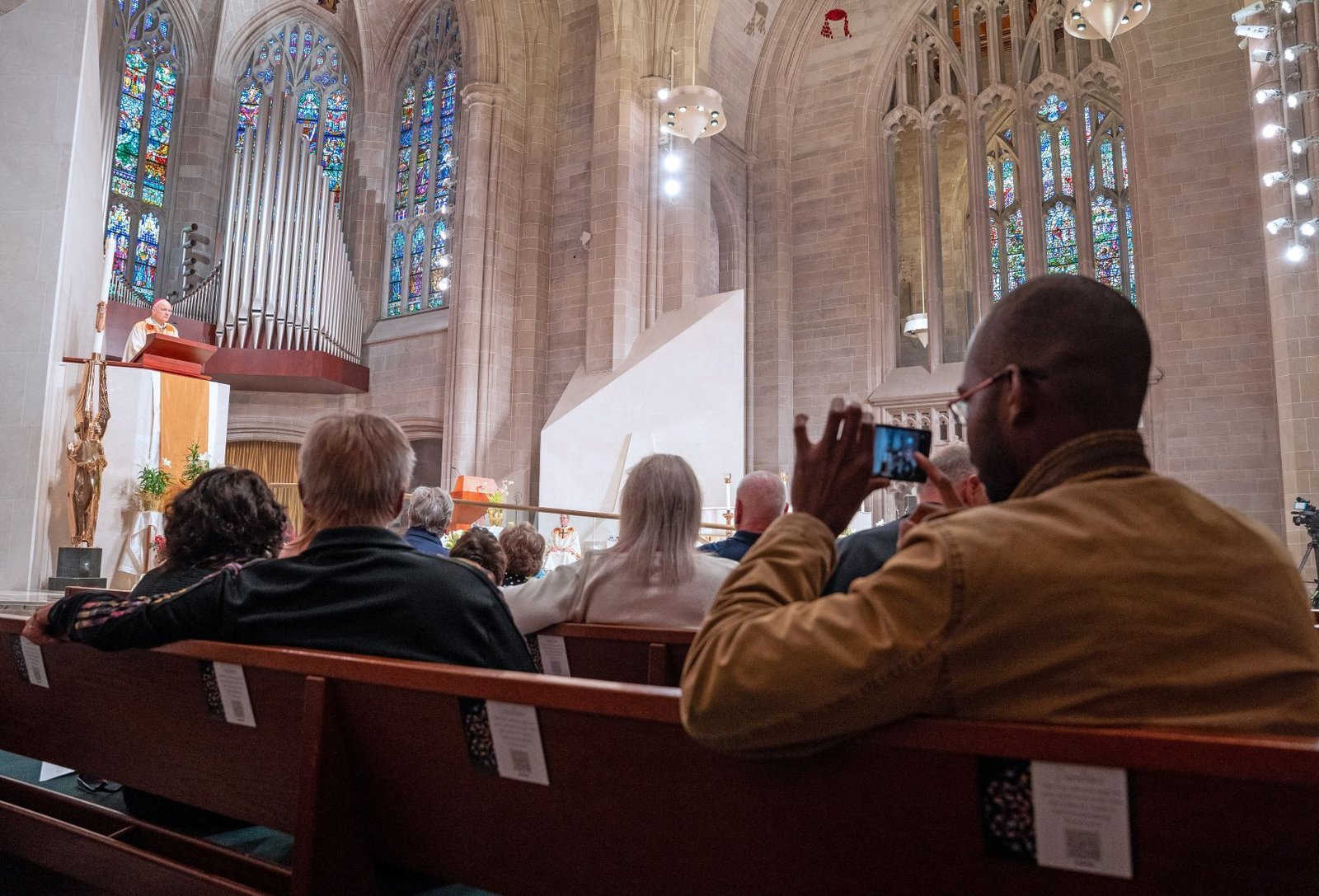Archbishop Weisenburger urges the Church to listen to the voice of Christ’s newest shepherd as a 'focal point of unity'
DETROIT — Catholics from across the Archdiocese of Detroit gathered May 10 at the Cathedral of the Most Blessed Sacrament as Archbishop Edward J. Weisenburger led the Church in Detroit in giving thanks to God for the election of Pope Leo XIV as supreme pontiff of the universal Church.
“I rejoice with Catholics and men and women of goodwill around the world today because we have been given a new successor of St. Peter,” Archbishop Weisenburger said in his homily.
The Mass, which liturgically was the vigil of the Fourth Sunday of Easter, was also an opportunity for those in attendance to rejoice in the special blessing of the election of Cardinal Robert F. Prevost — an Augustinian born in Chicago who spent much of his ministry in Peru and has Michigan ties — as Pope Leo XIV, the 267th pope in the history of the Catholic Church.
Archbishop Weisenburger reflected on the importance of the Petrine ministry in the Church, an integral part of the Church’s understanding of tradition, along with Scripture.

And while the volumes of Scripture have been set, tradition, properly understood, continues, Archbishop Weisenburger said.
“God’s revelation did not stop when Jesus ascended,” Archbishop Weisenburger said. “With Pentecost and the outpouring of the Holy Spirit, God’s ongoing revelation continues to unfold in a unique way in our Church. One of those unique and fundamental ways is established by Christ himself for St. Peter and his successors.”
By having the papacy — now embodied by Pope Leo XIV — rooted in one man to teach, govern, and sanctify the universal Church, Christ has established the means to achieve unity and cohesion in the Church, the archbishop said.
“I love the old saying, ‘God so loved the world He didn’t send a committee,’” Archbishop Weisenburger said. “No, we have a focal point of unity. We have someone who can discern — typically, as we’ve seen in recent years, in a very synodal way — and then when necessary or advantageous for the faithful, decide. And as much as we’re celebrating the election of Pope Leo XIV, our new Holy Father, a man born of our great nation, I think it’s important that we call to mind that we’re also celebrating the way Jesus Christ established his Church.”
Reflecting upon the Gospel passage from St. John designated for the Fourth Sunday of Easter, in which Christ identifies himself as the Good Shepherd, Archbishop Weisenburger asked the assembly to take note of the context of the passage.
Jesus and his apostles were in Jerusalem for the Jewish feast of the Rededication of the Temple, and St. John, at a time when ink and paper would be exceedingly expensive, chose to include that detail for a particular reason, he said.
In Judaism, the Temple was regarded as "the navel of the earth," where life springs forth, and "the place where God reached down from the heavens and touched the earth," the archbishop noted. In using such a setting, Jesus is telling his apostles that something greater has arrived.

“He's telling them it’s not the Temple anymore, that he is the Good Shepherd,” Archbishop Weisenburger said. “It’s not the word that flows from the Temple that we’re celebrating; it’s being bonded to my word that you will be led in the ways of life and truth and love. He is revealing who he is.”
In revealing his identity, Jesus is asking his disciples to follow in his footsteps, guiding and protecting his sheep.
And just as Jesus asked Peter — the first pope — to feed His sheep, Christ again is calling upon the faithful to look to Peter’s successor — Pope Leo XIV — as the new shepherd in whom Christ’s flock will hear and follow his voice, the archbishop added.
“And if we are bonded to the voice of the Good Shepherd and respond, we will always be led in the ways of truth,” Archbishop Weisenburger said. “I would suggest we listen for that voice, as it just may very well be echoed through the humble, loving, and perhaps at times challenging voice of Pope Leo XIV. For if we listen well and are willing to go where he calls us, then surely we will find ourselves among the lambs where Jesus walked.”
Copy Permalink
papal transition











